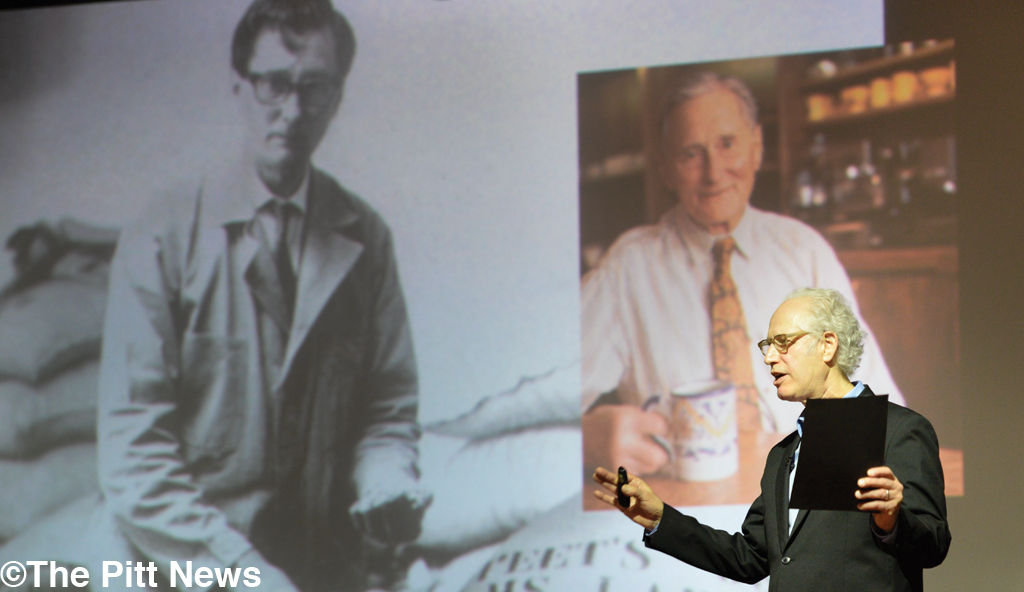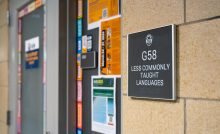

Starbucks co-founder Zev Siegl wants to invite you to lunch.
In a French restaurant in 1970, three friends from college — Zev Siegl, Jerry Baldwin and Gordon Bowker — met for lunch. Following their meals, a waiter offered the men shots of espresso. The bitter taste sparked an idea that would dominate Siegl’s life for the next 10 years.
Siegl invited students to this lunch scene during his presentation Wednesday night at Pitt. The Innovation Institute coordinated the speech as part of Innovation Week. Pitt launched the Institute a little under two years ago in collaboration with the Office of Career Development and Placement Assistance.
Innovation week is intended to “promote innovation and entrepreneurship to the community at Pitt” through various events, according to Babs Carryer, the Innovation Institute’s Director of Innovation and Outreach.
The week will end with the second University-based Pitt Startup Weekend. Beginning this Friday at 4:30 p.m. and continuing until Sunday afternoon, students from across the board will pitch ideas, recruit teammates and join in on projects.
“Students need a chance to vet their ideas,” Carryer said, “to dip their toe in the entrepreneurial waters.”
Siegl, who spoke to 148 Pitt students and future entrepreneurs last night in the assembly room of the William Pitt Union, co-founded Starbucks with his friends after that espresso round in 1970, when coffee bars and afternoon frappucinos were an unheard of concept. The startup has since blossomed into one of the world’s most successful coffee companies.
A self-proclaimed “startup man”, Siegl’s interest in businesses lies in their beginnings.
Siegl, who left Starbucks in 1981 — as he was not interested in dealing with the middle stages of business development — now spends his time speaking to, mentoring, advising and consulting young entrepreneurs. In the latter part of his career, far from slowing down, Siegl has become a startup consultant and has helped launch four businesses, including another coffee company, Quartermaine Coffee Roasters in Washington, D.C. He also worked with the Small Business Development Center in Washington, a network of advisors that helps small and medium-sized businesses develop, which he said he has gotten a lot out of personally.
“You could call it giving back,” Siegl said, referring to his work with students in business schools in Seattle.
Siegl suggests that before students decide to jump into the entrepreneurial waters, they should understand how to handle the hurdles of startup companies.
Siegl’s restaurant narrative highlights his first startup hurdle: choosing the right type of business. From there, Siegl goes on to talk about competition, funding and his most emphasized hurdle: financial forecasting.
Referring to what he calls the “hand-wavers”— young entrepreneurs who are passionate about their ideas — Siegl warned, “The number one issue is financial forecasting. It is important to go through the plan and evaluate with an analytic mind whether the excitement is something they should embrace.”
Siegl noted that after the decision to pick coffee as the business they would embark on, the three men spent six months doing the research — a process of continually asking why.
Back when Siegl, Bowker and Baldwin were running Starbucks, they didn’t have the resources that entrepreneurs take advantage of now. Today, technology has revolutionized the business world, allowing small business owners to use iPads in place of cash registers and creating a whole new role for social media and website design.
“I just love the digital age,” Siegl said, adding that, along with all of the efficiency and speed that comes with technology, entrepreneurs must understand the importance of professionalism and competition — advising against, for example, letting a cousin design the website if she or he isn’t a professional web designer with a handle on marketing.
Siegl’s last hurdle is about picking the right people to work with — a topic students trying to learn the ins and outs of networking could relate to immediately.
“I like people a lot,” Siegl said, a trait that has helped him immensely in his career.
Using this trait, the young enthusiastic Starbucks founder was able to approach Alfred Peet in the 1970s. Peet, founder of Peet’s Coffee and Tea, knew everything there was to know about coffee roasting. He would later become Siegl’s mentor and an absolutely vital part of his success.
“I wouldn’t be here without him,” Siegl said, while an image of the now deceased Alfred Peet appeared on the projector screen behind Siegl.
Siegl’s interest in people has also enabled him to enjoy his work with startup companies. He draws from an index of examples and experiences to demonstrate to new business owners the importance of assembling information and making informed decisions when it comes to choosing business ideas and strategies.
He advises students to “not get ahead of themselves,” emphasizing the importance of passion alongside a willingness to work with numbers.
Siegl’s passion for startup companies is evident. He talks about coffee shops like he’s referring museums he’s visited, excitedly suggesting shops with the nicest set ups — an indication that the owner has years of experience in the field.
When Siegl visits various cities around the world, including Paris and Kuwait City, he stops by Starbucks shops and is still amazed at the way every employee and barista is able to talk about the coffee being sold. He asks the baristas questions about the blends, if they’ve ever considered mixing Costa Rican and Panamanian roasts and if not, would they like to try it now?
“They don’t recognize me, of course,” Siegl said, laughing.
He summarizes that any company able to grow to that scale without losing their commitment to the product is admirable.
Siegl hoped that students will take his messages about hard work to heart.
“It’s not for everyone,” Siegl said, referencing the fact that not everyone is cut out for the hurdles entrepreneurs must face, “deciding to be an entrepreneur will really mess with your mind.”
Siegl’s experience proved useful to the students attending the presentation, who ranged from undergraduates to graduate school students and postdoctoral students, all with a wide-range of majors and interests.
Halid Mardini, a senior economics and psychology major, said he was inspired by Siegl’s visit because it gave him and other students the chance to “follow in his footsteps,” seeing his ideas flourish around the globe.
“If there’s a kid right now drinking a frappucino in Saudi Arabia,” Mardini said, “well then, [Siegl’s] got to be successful.”
Recent Posts
‘He’s off to a much faster and better start’: Republicans reflect the second Trump administration’s first two months
Since Inauguration Day Trump’s second term has caused division amongst young Americans. Despite these controversies,…
Who Asked? // Why do we accept bad treatment from people?
This installment of Who Asked? by staff writer Brynn Murawski attempts to untangle the complicated…
What, Like It’s Hard? // Lean on your people
Contributing editor Livia LaMarca talks about leaning on your support networks and gives advice on…
Note to Self // Hot Girl Summer
In the sixth edition of Note to Self, Morgan Arlia talks about how she is…
A Good Hill to Die On // Down to Date and Time
In the latest version of “A Good Hill to Die On,” staff writer Sierra O’Neil…
‘Dress for Success: Closet to Career’ alleviates the stress of building a professional wardrobe
As the end of the spring semester rapidly approaches, many Pitt students find themselves in…


